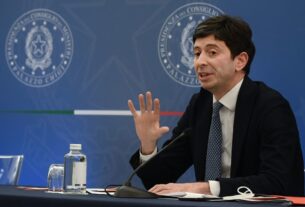Nuclear energy production is “unlikely” to be part of the next package of EU sanctions against the Kremlin for its invasion of Ukraine, while work on an oil-price cap is continuing, according to several diplomats briefed on the discussions.
The European Commission on Saturday organized meetings with top diplomats to listen to the proposals of EU member states before drafting the next package of measures against Moscow, which is expected to be presented next week.
Annexation referendums being held in Russian-occupied areas of Ukraine, which the G7 described as a “sham” on Friday, and the recent discovery of a mass grave in Izyum with more than 400 bodies have convinced many doves among EU member states that new measures have to be introduced.
But the diplomats said nuclear power is “unlikely” to be part of the package, even though Poland and the Baltic countries worked for the first time on a joint proposal for new sanctions that also included targeting Russia’s nuclear industry.
It is not that easy for the EU to include nuclear energy, which is a key sector in France, and also in Bulgaria, which exports energy to the Western Balkans and Greece. A ban is seen as problematic especially because of the issues that it could cause in terms of maintenance of the nuclear plants built in Bulgaria during the Communist era.
Meanwhile, a key factor in the new urge for more sanctions is pressure from the the U.S. to have a price-capping mechanism on Russian oil exports, as agreed by the G7 countries, in place by December 5, when EU sanctions banning seaborne imports of Russian crude come into force, according to diplomats.
“Americans stress that companies need a 90-day advance notice for the price cap to be introduced, and we are already late,” said one of the diplomats.
There’s some resistance to an oil-price cap, especially among Mediterranean islands like Cyprus, according to some of the diplomats, but they expect it will be part of the package in the end, although it’s likely it could be finalized only at a meeting of EU leaders in Prague at the start of next month.
“The Commission got the message that the oil-price cap is important to many countries,” said a second diplomat.
Other diplomats stressed that the price level itself still has to be worked out and more time is needed.
According to two of the diplomats the new package of sanctions is expected to include new import controls on diamonds, semi-finished steel products, machinery and chemicals. In addition, it is expected to include further tightening of export controls on electronic components and some new individual sanctions, this time on individuals involved in the referendums.
A group of countries including the Netherlands is also suggesting a new listing criterion in which assisting with sanctions evasion and circumvention would be grounds for sanctioning individuals.
“Sanctions implementation is in many cases one of the key problems for us,” stressed one of the diplomats.



